|
|
|
Sort Order |
|
|
|
Items / Page
|
|
|
|
|
|
|
| Srl | Item |
| 1 |
ID:
094485
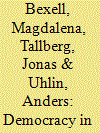

|
|
|
|
|
| Publication |
2010.
|
| Summary/Abstract |
The participation of transnational actors in global policymaking is increasingly seen as a means to democratize global governance. Drawing on alternative theories of democracy and existing empirical evidence, we assess the promises and pitfalls of this vision. We explore how the structuring and operation of international institutions, public-private partnerships, and transnational actors themselves may facilitate expanded participation and enhanced accountability in global governance. We find considerable support for an optimistic verdict on the democratizing potential of transnational actor involvement, but also identify hurdles in democratic theory and the practice of global governance that motivate a more cautious outlook. In conclusion, we call for research that explores the conditions for democracy in global governance through a combination of normative political theory and positive empirical research.
|
|
|
|
|
|
|
|
|
|
|
|
|
|
|
|
| 2 |
ID:
166144


|
|
|
|
|
| Summary/Abstract |
Little attention has been given to understanding how international courts feature in legitimacy assessments. How should the performance of international courts be evaluated in terms of their effect on a democratic deficit in international lawmaking? This article takes an initial step toward understanding how international courts improve or weaken the presence of democratic values in international lawmaking. In particular, this article focuses on one aspect of international courts—access for transnational actors. This article argues that TNA access to international courts provides an institutional mechanism to advance participation and transparency in international lawmaking. Normative and empirical analysis are combined to illustrate the extent to which access applies to international courts. Based on the empirical findings, which show a marked increase in TNA access to international courts, I argue that the increased participation and transparency made available through TNA access have democratizing effects on international lawmaking.
|
|
|
|
|
|
|
|
|
|
|
|
|
|
|
|
| 3 |
ID:
081860
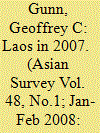

|
|
|
|
|
| Publication |
2008.
|
| Summary/Abstract |
Laos in 2007 unveiled new infrastructure linking the landlocked country with its neighbors. Just as Laos seeks to exploit its ample natural riches, so the country reinvents its sense of regional integration. Willy-nilly, such late-arriving globalization also brings the still largely isolated communist state under increasing international attention on a range of governance and human rights issues
|
|
|
|
|
|
|
|
|
|
|
|
|
|
|
|
| 4 |
ID:
154917
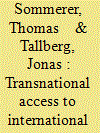

|
|
|
|
|
| Summary/Abstract |
This article introduces a new data set on the access of transnational actors (TNAs) to international organizations (IOs). While IOs were long the exclusive preserve of member governments, recent decades have witnessed a shift toward more inclusive forms of governance, involving participation by non-governmental organizations, philanthropic foundations, multinational corporations, and other forms of TNAs. Yet existing research has lacked the data necessary to map this phenomenon and its variation over dimensions such as time, issue areas, and world regions. The TRANSACCESS data set is designed for this purpose and contains information on the level of openness in 298 bodies of 50 IOs from 1950 to 2010. On the basis of this data set, we also introduce a first quantitative measure of institutional openness in the shape of a composite index, available at both the IO and body levels. This index can be used to compare TNA access across and within IOs but also as a variable in large-N studies on global and regional governance, where IO openness is potentially relevant.
|
|
|
|
|
|
|
|
|
|
|
|
|
|
|
|
| 5 |
ID:
156223
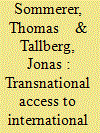

|
|
|
|
|
| Summary/Abstract |
This article introduces a new data set on the access of transnational actors (TNAs) to international organizations (IOs). While IOs were long the exclusive preserve of member governments, recent decades have witnessed a shift toward more inclusive forms of governance, involving participation by non-governmental organizations, philanthropic foundations, multinational corporations, and other forms of TNAs. Yet existing research has lacked the data necessary to map this phenomenon and its variation over dimensions such as time, issue areas, and world regions. The TRANSACCESS data set is designed for this purpose and contains information on the level of openness in 298 bodies of 50 IOs from 1950 to 2010. On the basis of this data set, we also introduce a first quantitative measure of institutional openness in the shape of a composite index, available at both the IO and body levels. This index can be used to compare TNA access across and within IOs but also as a variable in large-N studies on global and regional governance, where IO openness is potentially relevant.
|
|
|
|
|
|
|
|
|
|
|
|
|
|
|
|
| 6 |
ID:
147378
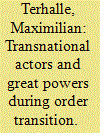

|
|
|
|
|
| Summary/Abstract |
This article rests on the assumption of the “complexity, messiness, power relations, and contested character of the contemporary dualistic system,” which comprises great powers and “superimposed, functionally differentiated global subsystems of world society” (Cohen 2012:5). The article argues that this framework is being shaped by the current transition of global order. In turn, this raises the question how the state-led negotiation of today's order transition can be understood against the backdrop of a post-Westphalian environment. The article challenges the widespread argument pertaining to the “autonomy of transnational actors” by suggesting that the influence of nonstate actors is dependent on a particular institutional context in which the key political questions framing a social order are settled. Whereas research on international institutions and their design simply assumes that this is the case, here it is argued that unless these framing patterns are agreed upon by major powers, the respective order and its elements, that is, institutions and regimes, remain contested or deadlocked. When this happens, the political impact of non-state actors is largely neutralized or strongly weakened and their effective autonomy from great powers is minimized.
|
|
|
|
|
|
|
|
|
|
|
|
|
|
|
|
|
|
|
|
|